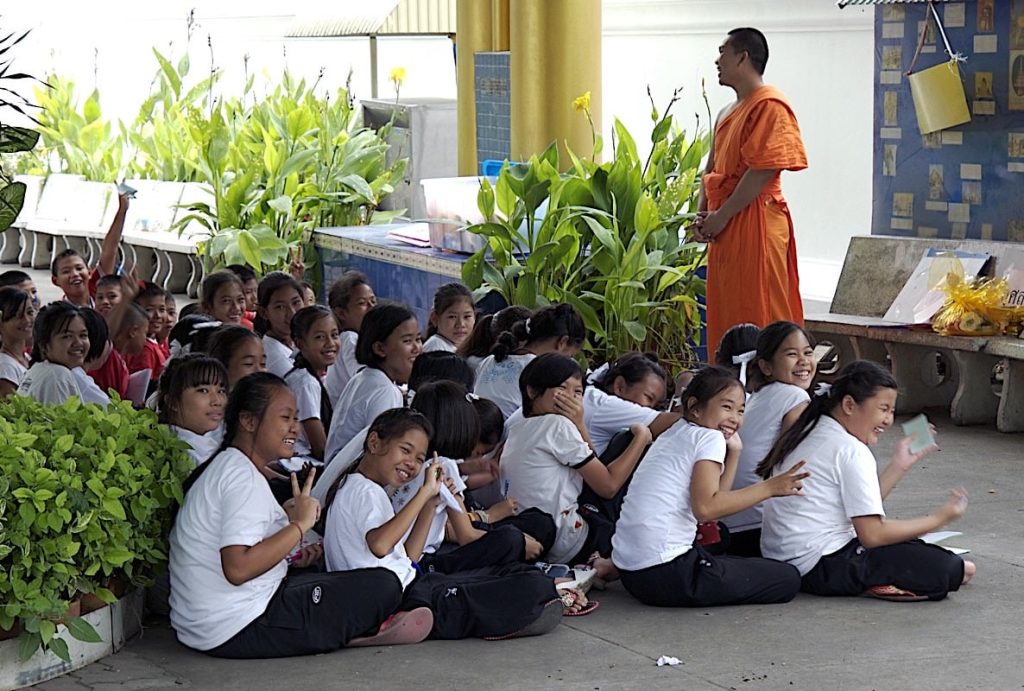
Buddhism has always been centered on learning. An analysis for Boston University outlines that simple piece of historical fact; from the Indian Buddhist practice of allowing all castes to attend sangha and receive a religious and vocational education, through to the, for example, Nalanda, which was effectively the world’s first residential university.
Contributing writer Karoline Gore
As with everything, Buddhism provides a guide to the modern day and how best to navigate the difficult times being lived in. One place in which much guidance is needed is, indeed, education. The digital age has thrown up barriers to learning, but, opportunities, too; and underneath all of this is the need for a radical rethinking of how education should work.
The focus on personal
The digital age has stripped away some of the personability of education, and this has been to the detriment of students. As a result, there has been a large uptake in the use of personal tutors, and especially in western countries. There’s a good reason for this, and that, too, can be found in Buddhist practice. As the Dharma Realm Buddhist University highlights, in a review of the teachings of Master Hsuan Hua:
“Buddhist education simply stated is the teaching of wisdom and compassion. It seeks for the liberation of human potential through the study and understanding of the mind and all its states.”
This needs to be reflected in the quality of teaching, and, increasingly, those looking for teaching are turning towards private tutoring. This is a good way to express Buddhist views on education through practice, as it allows a commitment to learning rather than simple pursuit of vocational skills. The challenge of finding the right personal tutor is a varied one; apart from the basic qualities of ensuring that students will be safe and secure, there is the matter of finding the right person. Tutors that focus on learning will be espousing these values.
Encouraging holistic learning
Another core tenet of Buddhist learning is a focus on holistic health in the learning process. The importance of the holistic approach is outlined by Middle Way Education, who note the teachings of His Holiness the Dalai Lama: “Modern education with its focus on material goals and a disregard for inner values is incomplete. There is a need to know about the workings of our minds and emotions. If we start today and make an effort to educate those who are young now in inner values, they will see a different, peaceful, more compassionate world in the future.” This points to a clear need for holistic learning.
As it happens, holistic learning can lend itself to greater success throughout the career – though career should not be the purpose of learning. Where students aim to learn for the sake of education, rather than to focus on a narrow point of vocational talent, it broadens their skills. Moving away from the modern educational focus on how learning will get a job, and looking at broader skills, actually helps with much-needed flexibility.
Moving together with technology
Education is increasingly being considered in terms of how it interacts with technology. Technology is a necessary part of life, though it can also be a huge distraction from life itself. It can be useful to consider the Buddha’s last words:
“All compounded things in the world are changeable; They are not lasting; Work hard to gain your own liberation; Practice diligently.”
Technology is perhaps the most changeable thing of all by its very nature – always evolving and advancing. When it comes to education, the key is to use it as a tool to enhance learning, but never replace it. As AI and similar technologies become more integrated with learning, it’s important to remember that guidance; practice diligently. Don’t let it overtake the purpose of learning.
Buddhism has a lot to offer modern education. The entire focus on technology and employability detracts from holistic wellbeing and, in the long run, can be a detriment to career prospects – ironically. As has always been the way, the key to a fulfilling and healthy life is through education, and seeing it as a way to grow personally – not just to make money.

